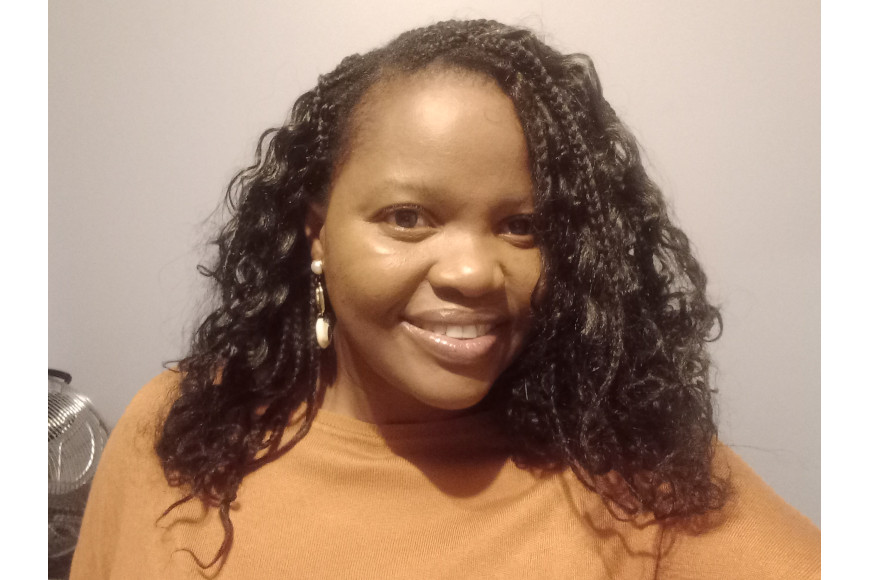“I am excited about graduation because it feels like the final seal on a long and winding road,” said an elated Thandeka Nxumalo.
The charismatic lecturer in the Department of Fashion and Textiles at the Durban University of Technology (DUT), originally from Pinetown, will be awarded her Master of Arts degree at DUT’s Autumn 2025 Graduation Ceremony.
Beaming with pride over her achievement, Nxumalo shared that her family’s unwavering support throughout her academic journey has made this milestone even more meaningful.
Nxumalo said she had started her journey towards a Master of Arts in Fashion qualification in 2019. She then took a break in 2020 during COVID-19. “I re-registered in 2021, changed my topic, and was allocated a new supervisor, who held my hand until I submitted my thesis in December 2024,” she divulged.
Giving a glimpse into her dissertation topic, Nxumalo conveyed that her topic focused on the suitability of SANS 434:2018 women’s measurements for body shapes of South African women who wear personal protective clothing (PPC).
“My study investigated the suitability of the South African National Standards (SANS) 434:2018 women’s workwear measurements for South African women working in previously male dominated industries. Historically, women in these sectors wore personal protective clothing (PPC) designed for men, resulting in ill-fitting workwear. The research aimed to address these fit issues and improve the comfort, safety, and suitability of PPC for women,” she said
Informed by the positivist research paradigm, this study used a conceptual framework showing the key factors involved in sizing and fit to investigate the fit requirements of a representative sample of women working at the eThekwini Municipality DSW department. “The findings revealed that the SANS specifications did not adequately accommodate women’s body shapes, particularly in respect of trousers, though the jacket fit was more acceptable. Participants also expressed dissatisfaction with the current PPC, as they felt that the garments were unsuitable for their bodies and preferred darker trousers over the bright orange uniforms for practical reasons, such as stain concealment during menstrual cycles,” she added. Further into this study, she explained that she provided a new measurement specification better suited to the participants’ body shapes, and is thought to contribute in a small way to the anthropometric data available for South African women’s workwear.
For Nxumalo, her journey was filled with some challenges where she needed to manually take body measurements of 150 women and needed a workplace to give her access to their female workers and time to conduct data collection. “It was difficult to secure a workplace for data collection. I am thankful to Durban Solid Waste Management who took an interest in my study and supported my study and allowed me to conduct research at their premises during their working time,” she relayed.
She shared that she undertook this field of study to address a real-world issue of ill-fitting workwear garments for women. “My passion lies in the technical side of garment construction and understanding the diversity of women’s body shapes. Through this research, I aim to improve the fit, comfort, and overall safety of workwear for women, especially those working in overalls in industries that were once male-dominated. I hope that the findings from this study will contribute to creating better, more inclusive workwear that supports the needs of women in these demanding environments,” she reiterated.
Looking ahead, Nxumalo says obtaining her PhD in Fashion is on the cards and is looking forward to this new adventure in time to come.
“I recently began my journey in academia as a lecturer, and I’m excited to use my industry experience and research to make a meaningful impact on the development of our fashion students. My aim is to bridge the gap between theory and practice, helping students connect classroom learning with real-world applications. I’m also eager to grow further in my academic journey by expanding my research skills and engaging more deeply in academic writing and publication,” she highlighted.
Nxumalo says she associates with all the DUT living values (transparency, honesty, integrity, respect, and accountability), as they represent her personal and Christian values, which she uses as an anchor and a guide in everything she does and all the decisions that she makes.
Imparting her advice to first year students, Nxumalo indicated that students should back their passion with strong technical knowledge and to stay open-minded as they learn new skills and concepts. “Fashion is a balance of creativity and technical precision-you may have amazing ideas, but without the technical know-how, it becomes difficult to bring those ideas to life. Embrace the learning process, because it’s through mastering the technical side that you gain the freedom to truly innovate,” she said.
Pictured: Thandeka Nxumalo
Waheeda Peters

